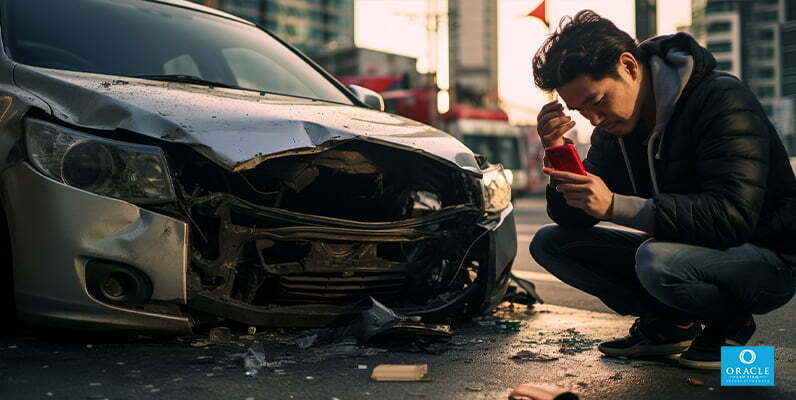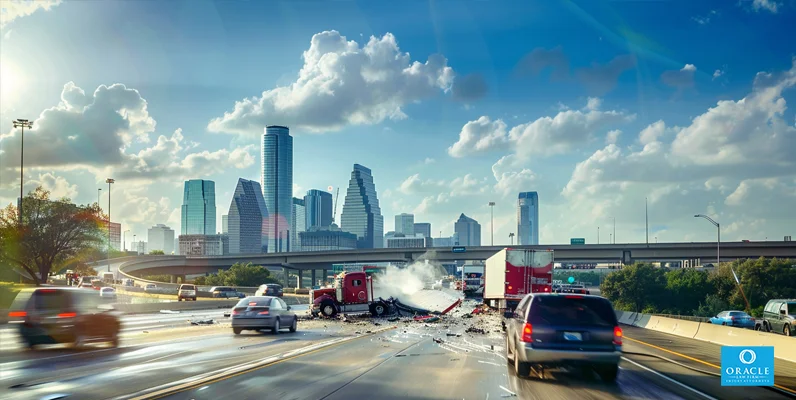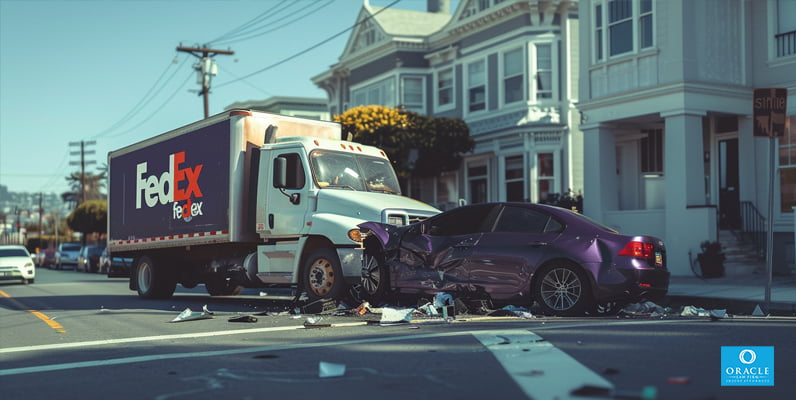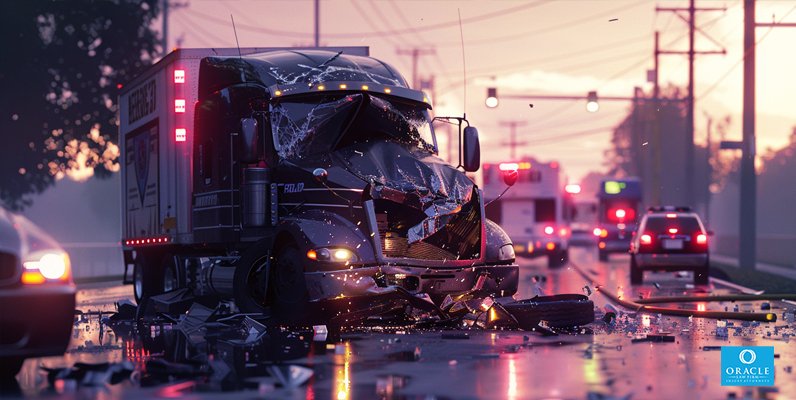How Long Do You Have to Report a Car Accident to Your Insurance in California? Drivers in California are mandated to have auto insurance coverage that fulfills the state’s set coverage standards. California employs a fault-based system in car accidents to ascertain who is responsible for the damages. Each car insurance policy should cover individual bodily injury, total accident bodily injury, and property damage. The baseline coverage values are $15,000, $30,000, and $5,000, respectively. Additionally, it’s advised for drivers to include underinsured/uninsured motorist protection in their primary insurance package.
Should an accident happen, the driver at fault is responsible for covering the damages. The victim can lodge an insurance claim against the driver at fault’s insurance. Addressing the claim involves various steps and formalities. One of the paramount steps in dealing with car accident claims in California is the obligation to report the accident. If an accident leads to injury, fatality, or significant property damage, drivers must notify the authorities by dialing 911. Furthermore, regardless of the critical details of the accident circumstances, drivers must inform their insurance carriers.
Your Personal Rights in the State of California
As a driver in a car accident in California, you have certain rights that protect you and ensure fair treatment throughout the claims process. These rights include:
- The right to seek medical treatment: If you have been injured in a car accident, you have the right to seek medical treatment for your injuries. Documenting your injuries and keeping records of all medical expenses incurred due to the accident is important.
- The right to file a claim: You have the right to file a claim with your insurance company or the at-fault driver’s insurance company to seek compensation for your injuries and damages. Reporting the accident and filing a claim immediately is important to ensure timely processing.
- The right to legal representation: You can hire a car accident lawyer to represent your interests and guide you through the claims process. An experienced attorney can help you navigate complex legal procedures and negotiate with insurance companies on your behalf.
- The right to be treated fairly: You have the right to be treated fairly by insurance companies and other parties involved in the claims process. This includes receiving prompt and fair compensation for your injuries and damages.
It is important to be aware of your rights and take appropriate steps to protect them after a car accident in California.

Do I Need to Report a Car Crash to Law Enforcement in California?
In California, it is generally required to report a car crash to law enforcement if it meets certain criteria. According to the California Vehicle Code, you must report a car accident to law enforcement if:
- The accident resulted in injury or death: If anyone involved suffered an injury or was killed, you must report the accident to law enforcement immediately. In such cases, you should dial 911 to notify the authorities.
- The accident caused significant property damage: If the accident resulted in significant property damage, such as damage to vehicles or other property, you must report the accident to law enforcement. The California Vehicle Code defines significant property damage as damage exceeding $1,000.
Reporting a car crash to law enforcement is important for several reasons. First, it ensures that the accident scene is properly documented, which can be crucial for insurance claims and legal proceedings. Second, it allows law enforcement to investigate the accident and determine who was at fault. Finally, it helps ensure all parties’ safety by allowing law enforcement to assist and manage traffic if necessary.
How long do I have to report a hit-and-run in California?
In the unfortunate event of a hit-and-run accident in California, where the at-fault driver flees the scene without providing their information, it is crucial to report the incident promptly under state law first. California law states you must report a hit-and-run accident to law enforcement within 24 hours.
When reporting a hit and run, provide as much information as possible to help law enforcement identify the responsible party. This includes details about the vehicle, such as the make, model, color, license plate number, and any other relevant information about the incident. Additionally, if there were any witnesses to the accident, try to obtain their contact information, as it may be helpful in the investigation.
Reporting a hit and run promptly increases the chances of identifying the responsible party and ensures you comply with the legal requirements. Failure to report a hit-and-run accident within the specified time frame may result in penalties and potentially affect your ability to seek compensation for your damages.
What Happens If I Fail to Report an Accident?
Failing to report a car accident in California can have serious consequences. Understanding the potential ramifications of not reporting an accident and fulfilling your legal obligations is important.
Under California law, failing to report an accident can result in criminal charges. If the accident resulted in injury or death, the failure to report an auto accident can be considered a misdemeanor or even a felony, depending on the severity of the injuries or the circumstances of the accident. Additionally, failing to report an accident can lead to the suspension of your driver’s license and may affect your ability to file an insurance claim.
Reporting an accident is a legal requirement and a responsible and ethical action. It allows for the proper incident documentation, ensures the safety of all parties involved, and facilitates the claims process. It is always best to report an accident promptly and cooperate with law enforcement and insurance companies to avoid potential legal and financial consequences.

How long do you have to report a car accident to your insurance company in CA?
In California, reporting a car accident to your insurance company as soon as possible is important. While no specific time limit to report accidents promptly is set by law, insurance companies generally require prompt notification of accidents to initiate the claims process. Failure to report an accident promptly may result in a denial of your claim or delays in processing.
When reporting a car accident to your insurance company, provide accurate and detailed information about the incident. This includes the date, time, and location of the accident, as well as the names and contact information of all parties involved. Additionally, describe the damages and injuries sustained, if any.
It is advisable to report the accident to your insurance company even if you believe you were not at fault or if the damages seem minor. Sometimes, seemingly minor auto accidents can result in hidden damages or injuries that may become apparent later. Reporting the accident promptly allows your insurance company to assess the situation and provide guidance on the next steps.
Remember, each insurance provider and policy may have specific requirements for reporting accidents, so it is important to carefully review your policy and follow the instructions provided by your insurance company.
Should I file a police report for a minor car accident in California?
Even for minor car accidents in California, it is generally recommended to file a police report. While it may seem unnecessary for minor accidents with no apparent injuries or significant damages, filing a police report can be beneficial for several reasons.
First, a police report provides an official record of the accident. This can be important when dealing with insurance companies, as it helps establish the facts of the accident and can prevent disputes regarding liability or damages. It also serves as a valuable piece of evidence if legal action becomes necessary.
Second, a police report can help protect your rights and interests. It ensures that all relevant information about the accident is documented, including the other driver’s contact information and any witnesses. This information can be crucial if you discover hidden damages or injuries or if the other party disputes their involvement and financial responsibility in the accident.
Finally, filing a police report allows law enforcement to investigate the accident and determine who was at fault. This can be particularly important if the other driver changes their story or if conflicting accounts of the accident occurred. Law enforcement can gather evidence, interview witnesses, and objectively assess the situation.
Filing a police report for a minor car accident in California is generally recommended. It helps protect your rights, provides an official accident record, and can be valuable in insurance claims and legal proceedings.
How do I report a car accident in California if the other driver doesn’t have insurance?
If you are involved in a car accident in California and the other driver or motor vehicle does not have insurance, it is important to take certain steps to protect your rights and seek compensation for your damages.
- Gather information: Collect as much information as possible about the other driver, including their name, contact information, and license plate number. If there were any witnesses to the accident, obtain their contact information.
- Report the accident to law enforcement: Regardless of the other driver’s insurance status, it is important to report the accident to law enforcement. Dial 911 to notify the authorities and provide them with all the relevant details about the accident.
- Notify your insurance company: Contact and inform them about the accident. Your insurance policy may cover uninsured motorist claims even if the other driver is uninsured. Your insurance company can guide you through the claims process and help you seek compensation for your damages.
- Consult with a car accident lawyer: It is advisable to consult with a car accident lawyer who specializes in uninsured motorist claims. An experienced attorney can assess your case, help you understand your legal options, and negotiate with insurance companies on your behalf.
- Document your damages: Keep records of all damages and expenses related to the accident, including medical bills, repair costs, and any other financial losses. This documentation will be important when seeking compensation for your damages.
Dealing with an uninsured driver can be challenging, but these steps can help protect your rights and increase your chances of recovering compensation from the insurance carrier for your damages.

What Is the California Car Accident Statute of Limitations?
The statute of limitations is a legal time limit within which a legal claim must be filed. California’s statute of limitations for car accident claims is generally two years from the accident date. If you fail to file a claim within this time frame, you may lose your right to seek compensation for your injuries and damages.
It is important to note that the statute of limitations may vary depending on the case’s specific circumstances. For example, if the accident resulted in the death of a person, the statute of limitations for filing a wrongful death claim is generally two years from the date of the person’s death.
Understanding and adhering to the statute of limitations is crucial when filing a car accident claim in California. Failing to file within the specified time frame can result in the dismissal of your claim and the loss of your right to seek compensation. Consulting with a car accident lawyer can help you meet all the necessary deadlines and protect your legal rights.
When Should I Start Filing My Claim?
After a car accident in California, starting the claims process as soon as possible is important. Promptly filing your claim can help ensure you meet all the necessary deadlines and increase your chances of a successful outcome. Here are some key steps to consider when filing your claim:
- Report the accident to your insurance company: Notify your insurance company about the accident as soon as possible. Most insurance policies require prompt reporting of accidents, and failure to do so may result in denying your claim.
- Gather evidence: Collect evidence to support your claim, including photographs of the accident scene, vehicle damage, and any visible injuries. Obtain copies of the police report, medical records, and other relevant documents.
- Seek medical treatment: If you have been injured in the accident, seek medical treatment immediately. Prompt medical attention not only ensures your well-being but also provides documentation of your injuries, which is crucial for your claim.
- Consult with a car accident lawyer: Consider consulting with a car accident lawyer specializing in personal injury claims. An experienced attorney can guide you through the claims process, help you gather evidence, and negotiate with insurance companies on your behalf.
- Document your damages: Keep records of all damages and expenses related to the accident, including medical bills, repair costs, and any other financial losses. This documentation will be important when calculating the value of your claim.
By taking these steps and starting the claims process promptly, you can protect your rights and increase your chances of receiving fair compensation for your injuries and damages.
The Loss of Important Evidence
In the aftermath of a car accident, preserving and documenting any evidence related to the incident is crucial. Failure to do so can result in losing important evidence for your claim. Here are some common examples of evidence that should be preserved:
- Photographs: Take photographs of the accident scene, including the vehicles involved, the position of the vehicles, and any visible damages. These photographs can provide valuable visual evidence of the accident.
- Witness statements: If there were any witnesses to the accident, obtain their contact information and ask them to provide a statement about what they saw. Witness statements can help establish the facts of the accident and support your claim.
- Police report: Obtain a copy of the police report filed at the accident scene. The police report contains important details about the accident, including the officer’s observations, statements from involved parties, and any citations issued.
- Medical records: If you sought medical treatment for your injuries, keep copies of all medical records, including diagnoses, treatment plans, and bills. These records provide evidence of your injuries and the medical expenses incurred due to the accident.
- Repair estimates: Obtain repair estimates from reputable auto repair shops if your vehicle was damaged in the accident. These estimates can help establish the cost of repairing the damages caused by the accident.
Preserving and documenting evidence is crucial for building a strong car accident claim. It helps establish liability, prove the extent of damages, and support your case during negotiations with insurance companies or in court. If you are unsure what evidence to preserve or how to document it, consult a car accident lawyer who can provide guidance based on your situation.

Do I Need a Lawyer for a Car Accident Claim?
While hiring a lawyer for a car accident claim in California is not mandatory, it is highly recommended, especially for complex cases or serious injuries. Here are some reasons why you may need a car accident lawyer:
- Legal expertise: Car accident lawyers specialize in personal injury law and have extensive knowledge and experience handling car accident claims. They understand the legal complexities and can navigate the claims process more effectively.
- Maximizing compensation: A car accident lawyer can help you assess the full extent of your damages, including medical expenses, lost wages, pain and suffering, and future medical needs. They can negotiate with insurance companies to ensure you receive fair compensation for injuries and damages.
- Dealing with insurance companies: Insurance companies often try to minimize payouts and may use various tactics to undervalue or deny your claim. A car accident lawyer can handle all communication with insurance companies, protecting your rights and not exploiting you.
- Investigating the accident: In some cases, determining liability in a car accident can be complex. A car accident lawyer can thoroughly investigate, gather evidence, interview witnesses, and reconstruct the accident to establish fault and strengthen your claim.
- Legal representation in court: Having a car accident attorney by your side is crucial if your case goes to court. They can present your case, cross-examine witnesses, and argue on your behalf to maximize your chances of a favorable outcome.
While you have the option to handle your car accident claim on your own, hiring a car accident lawyer can significantly increase your chances of a successful outcome and ensure that your rights are protected throughout the claim process itself.
What happens if you don’t report a car accident in California?
Failing to report a car accident in California can have serious consequences. Understanding the potential ramifications of not reporting an accident and fulfilling your legal obligations is important.
Under California law, failing to report an accident can result in criminal charges. If the accident resulted in injury or death, the failure to report can be considered a misdemeanor or even a felony, depending on the severity of the injuries or the circumstances of the accident. Additionally, failing to report an accident can lead to the suspension of your driver’s license and may affect your ability to file an insurance claim.
Reporting an accident is a legal requirement and a responsible and ethical action. It allows for the proper incident documentation, ensures the safety of all parties involved, and facilitates the claims process. It is always best to report an accident promptly and cooperate with law enforcement and insurance companies to avoid potential legal and financial consequences.
How Does “Pure Comparative Negligence” Work?
In California, the legal concept of “pure comparative negligence” determines the allocation of fault and liability in car accident cases. Under pure comparative negligence, each party involved in the accident can be assigned a percentage of fault based on their contribution to the accident.
For example, if a car accident occurs and one driver is found to be 80% at fault while the other driver is found to be 20%, the damages awarded will be reduced by the percentage of fault assigned to each party. In this case, if the total damages were $100,000, the driver who was 80% at fault would be responsible for $80,000, and the driver who was 20% at fault would be responsible for $20,000.
Pure comparative negligence allows for a fair and equitable distribution of liability in car accident cases. It considers the actions and negligence of all parties involved rather than placing the blame solely on one party. This means that even if you were partially at fault for the accident, you might still be able to recover compensation for your damages, although the amount may be reduced based on your percentage of the at-fault party part.
It is important to note that pure comparative negligence can complicate the claims process and negotiations with insurance companies. Insurance adjusters may try assigning you a higher percentage of fault to minimize their liability. This is where the expertise of a car accident lawyer can be invaluable. A lawyer can advocate for your rights, gather evidence to support your case and negotiate with insurance companies to ensure you receive fair compensation based on the true allocation of fault.
What If I’m Partly At Fault for My Car Accident In California?
If you are partly at fault for a car accident in California, you may still be able to recover compensation own insurance company for your damages. California follows the legal principle of pure comparative negligence, which means that each party involved in the accident can be assigned a percentage of fault based on their contribution.
Even if you are found to be partially at fault, you can still pursue a personal injury claim and seek compensation for your damages. However, your compensation will be reduced by the percentage of fault assigned to you.
For example, if you are found to be 20% at fault for the accident, and the total damages are $100,000, you would be eligible to recover 80%, which amounts to $80,000.
It is important to note that California’s pure comparative negligence system allows for recovery even if you are found to be mostly at fault for the accident. However, it is crucial to have strong evidence and legal representation to support your claim and protect your rights.
Consulting with a car accident lawyer is highly recommended if you are partly at fault for a car accident. An experienced attorney can assess the circumstances of the accident, gather evidence to support your case and negotiate with insurance companies to ensure you receive fair compensation based on the true allocation of fault.
Understanding the reporting requirements and time limits for car accidents in California is crucial for protecting your rights and ensuring a smooth claims process. Promptly reporting the accident to law enforcement and your insurance company is essential, as failure to do so can have serious consequences. Consulting with a car accident lawyer can provide valuable guidance and legal representation throughout the claims process. Remember to preserve and document any evidence related to the accident, as it can be crucial for establishing liability and maximizing your chances of receiving fair compensation for your injuries and damages.






